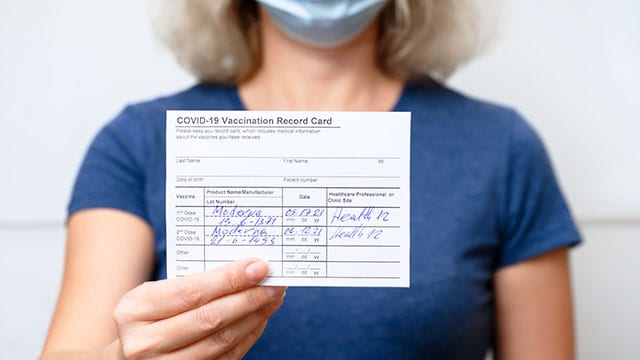As coronavirus cases continue to surge around the nation, President Biden has taken a harder stance against those unwilling to vaccinate by issuing vaccine mandates. Recent polling shows that most Americans continue to support his mandates so far—and 65% support a universal mandate.
The survey from a consortium of universities, including Northwestern, Northeastern, Harvard and Rutgers, shows a majority would also support narrower vaccine mandates for students attending school or college and for travelers flying commercially. Six out of 10 Americans also support requiring large companies to either vaccinate or regularly test their employees for COVID-19.
Conducted between Aug. 26 and Sept. 27, the survey of more than 20,000 Americans came as President Biden issued a Sept. 9 executive order requiring all federal employees to be vaccinated. He also directed the Department of Labor to issue an emergency rule requiring workers in companies of 100 or more employees to be fully vaccinated or to submit to weekly COVID-19 testing.
Despite President Biden’s actions to curb the spread of COVID-19, another survey conducted at the same time finds that approval of his handling of the pandemic dropped from 57% in June to 49% by September. His approval ratings also declined across political parties, dropping by 5% among Democrats, 7% among Republicans and 8% among Independents. Still, President Biden’s coronavirus approval rating remains higher than former President Trump’s approval rating of 34% at the same time last year.
“It does not seem that the mandate per se is at play in the approval effects; our data suggest that it was more about frustration with the general pandemic and the steps backwards caused by the delta variant,” said political scientist James Druckman, one of the consortium researchers.
Druckman is the Payson S. Wild Professor of Political Science in the Weinberg College of Arts and Sciences and associate director of the Institute for Policy Research at Northwestern.
The pandemic’s trajectory also affected what Americans thought of their governors—states with the highest COVID-19 case rates have lower governor approval ratings (42%) compared to states with lower case rates. Vaccine mandates did influence governors’ approval more than Biden’s, with governors who prohibited vaccine mandates having the lowest approval ratings of all. The governors who saw the largest declines were those of Alaska, Arkansas, Idaho, Mississippi, Nevada Ohio, Oklahoma, Virginia and Wisconsin, with their approval rates dropping double digits ranging between 10% and 34%. Republican governors Mike DeWine of Ohio and Brad Little of Idaho saw the largest drops in public opinion in their states, at 34% and 32% respectively.
Overall, Democratic governors have seen a large partisan gap in approval because of a large decrease in Republican approval—from 58% in April 2020 to 29% by September 2021. Approval of Republican governors also fell for the same reason, dropping from 77% to 55% over the same period.
Other key findings:
- While the majority of Americans across demographic groups support a vaccine mandate, Republicans remain the most resistant. Fewer than half support an overall mandate (43%), and only 35% support a mandate for large companies. In terms of education, 41% of Republicans support a mandate for schoolchildren and 47% for college students.
- Though the gender gap for universal vaccine mandates narrowed by 5 percentage points, women continue to be less supportive of requiring everyone to receive vaccines compared to men (63% to 67%).
- White Americans are the least likely of any racial group to support an overall mandate, with their support falling 1 point from 62% to 61% while support among other races and ethnicities grew slightly or remained steady. The group most supportive is that of Asian Americans, nudging up from 80% to 83%.
- President Biden’s support from unvaccinated Americans declined the most—by 11 percentage points from 36% to 25%—of any of the demographic groups surveyed.
Previous survey reports can be found here.


